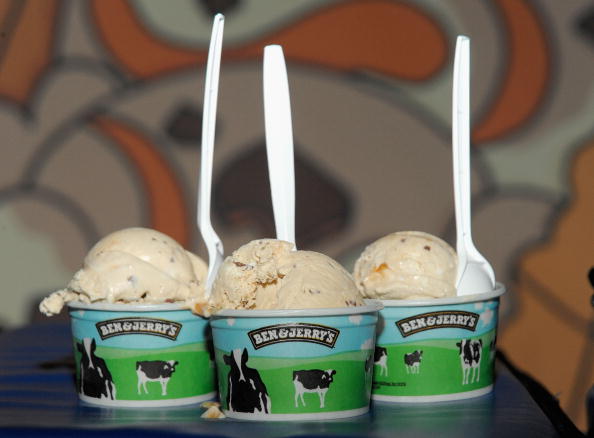The cold blast of popular opinion: ice cream maker Ben & Jerry’s takes on the home secretary

It was a young political journalist who summed up one of the oddest political storms of the summer so far when she tweeted on Wednesday: “Who had ‘MP argues with ice cream company’ on their 2020 bingo card?”
In case you missed it, the story in brief: Priti Patel, the home secretary, has been making headlines over the refugee “crisis”, prompted by images of flimsy, overcrowded dinghies beaching on the south coast. Earlier this week, the UK arm of ice cream makers Ben and Jerry’s responded on Twitter that “the real crisis is our lack of humanity for people fleeing war, climate change and torture”. The storm broke, and is continuing.
This is an odd culture clash. On the one hand, a Conservative government elected with a healthy majority having made pledges to “take back control” and secure the island’s borders; on the other, a Vermont-based manufacturer of ice cream with a dizzying array of flavours and a penchant for showing its social conscience.
It’s only fair to say that this isn’t B&J’s first foray into politics. It has pledged support for a number of environmental causes, and its founders Ben Cohen and Jerry Greenberg are active in Democratic Party politics in the US, with Cohen designing a new flavour to endorse Bernie Sanders bid for his party’s presidential nomination.
Read more: The sweetest thing: Ben & Jerry’s CEO on why businesses need a higher purpose
This liberal, feel-good persona is part of B&J’s sales proposition. In some ways, it is the ultimate capitalist compromise: a tasty but calorific treat which soothes the conscience as well as the tonsils. It has served the company well, as they enjoy a 30-odd per cent market share in the luxury ice cream sector in the UK, and about 10 per cent in the US. Having a social conscience and purpose is good business.
But there’s a problem. Ben and Jerry’s was indeed founded by liberal-minded college dropouts in the late 1970s, and grew slowly as a business rooted in its rural New England community. But for the last 20 years it has been owned by Anglo-Dutch conglomerate Unilever, which has an annual turnover north of $50bn. There are more than 600 B&J’s franchises worldwide. However powerful the myth-making, Cohen and Greenfield – who admit they now have “no responsibility, no authority” – are no longer the little guys standing up to the corporate beast.
Nor does the company have entirely clean hands. It has been criticised for its use of palm oil, its hiring of illegal immigrants working for less than the minimum wage and on long shifts, and for some controversial flavour names which, if well-intentioned, have sometimes come across clumsily.
This is dangerous. It is now a truism of the business world that authenticity is vitally important in commercial success, because of the connection it forms with the consumer, the bond of trust it develops and the strong sense of investment it gives the marketplace. Ben and Jerry’s, by some pious posturing, has set itself up for a fall on social media and, by extension, in the public eye – and it’s already happening.
We live in a world all too willing to divide on tribal lines, and already the hashtag #boycottbenandjerrys is abroad on Twitter. Companies, especially large corporations, need to think very carefully before committing to the political arena, and it is not yet clear that Ben and Jerry’s has got this right.
Read more: Unilever may abandon HQ unification over €11bn Dutch tax bill
Main image credit: Getty
